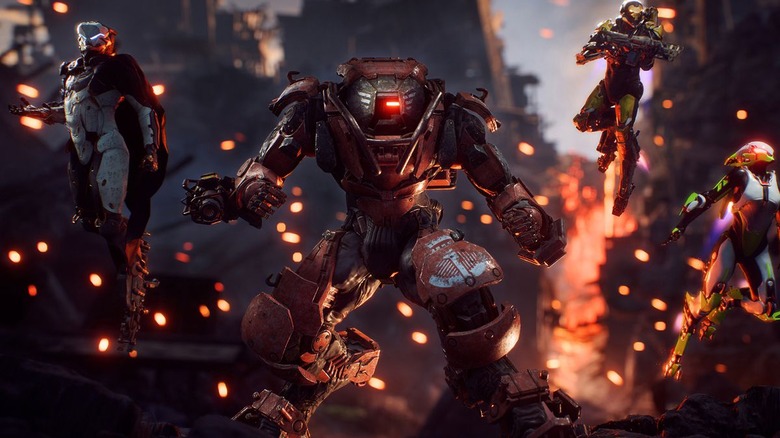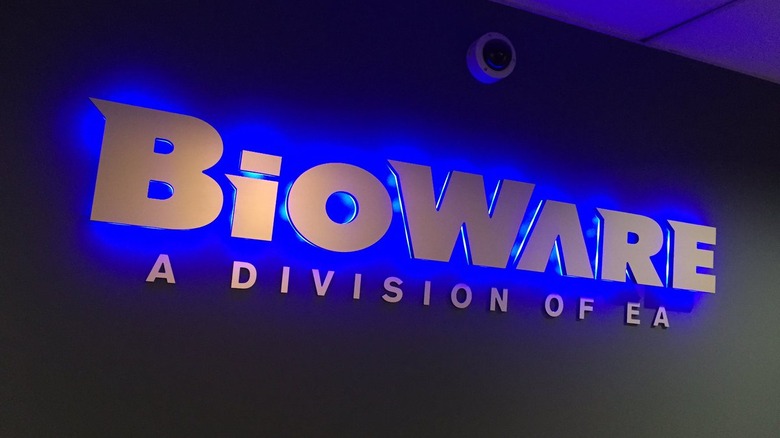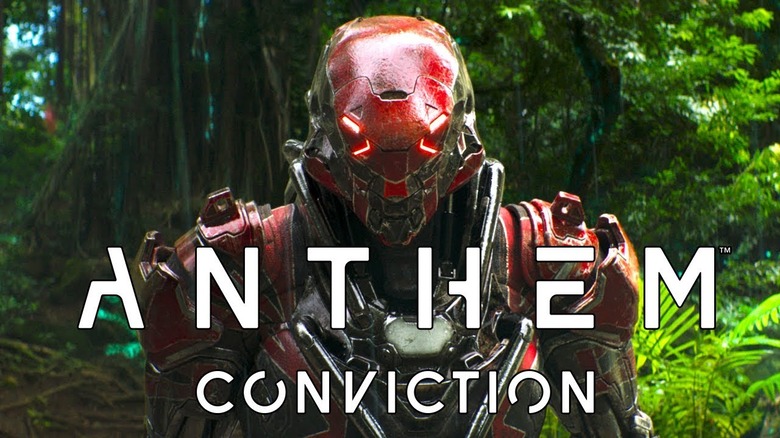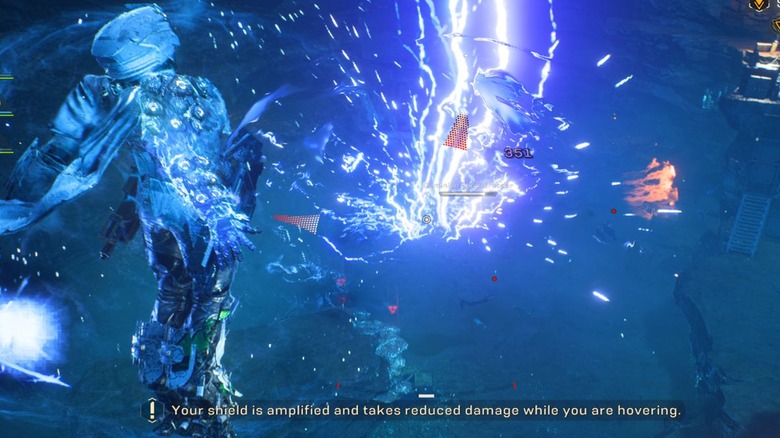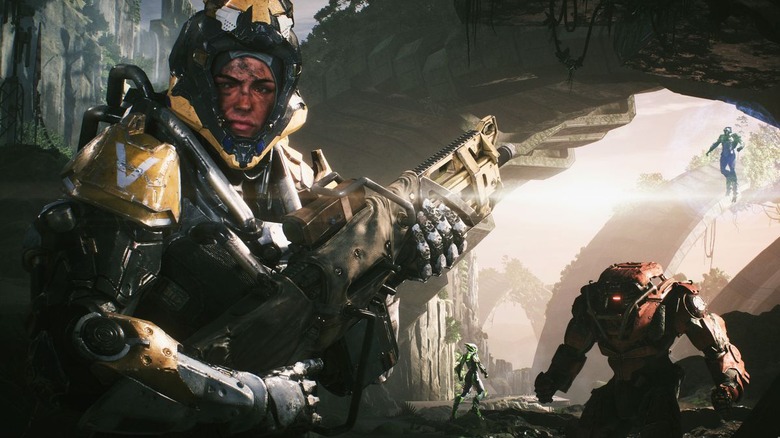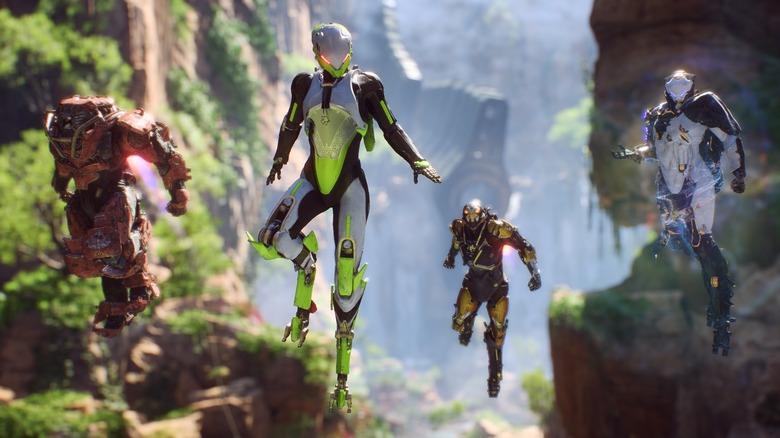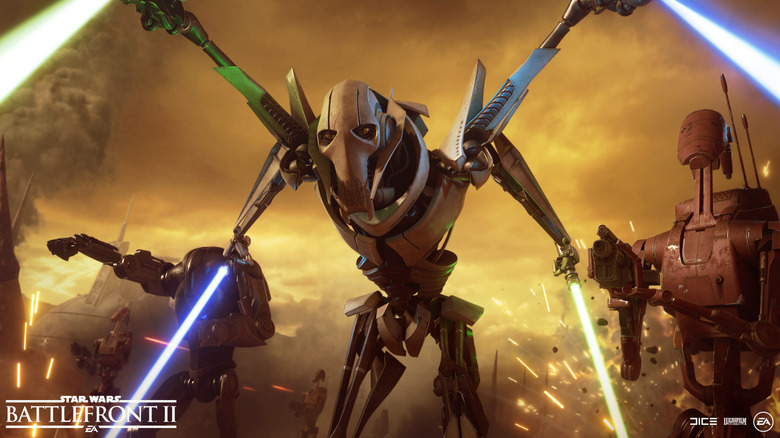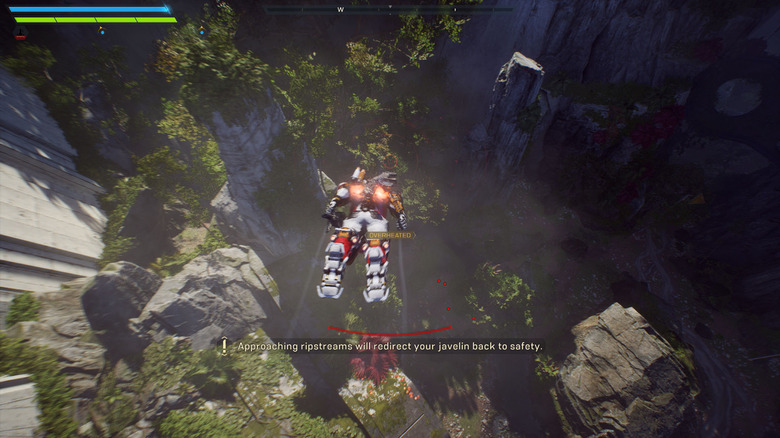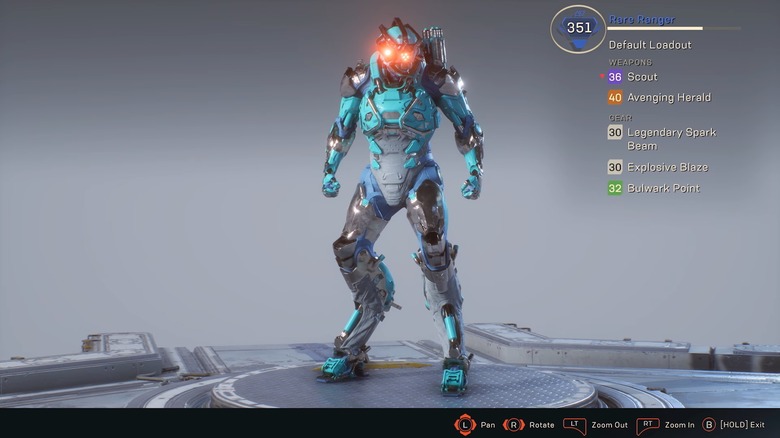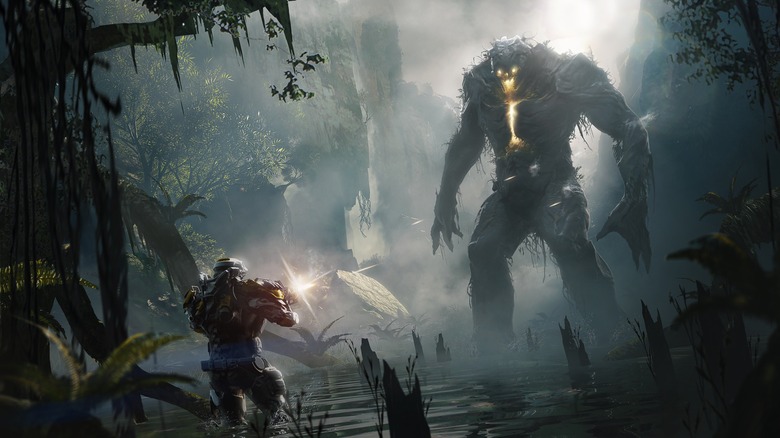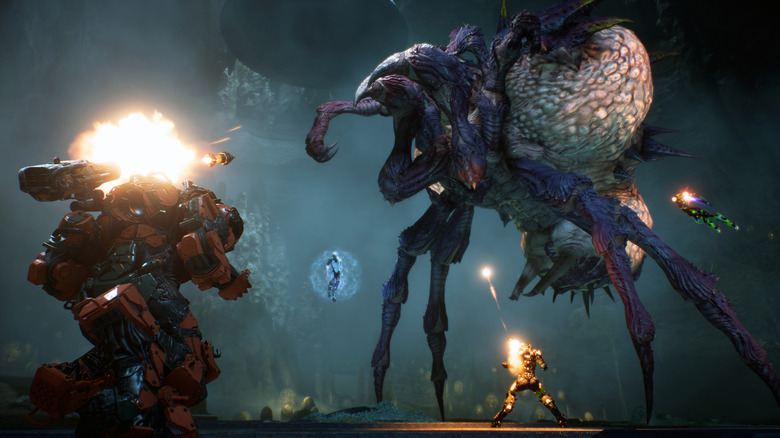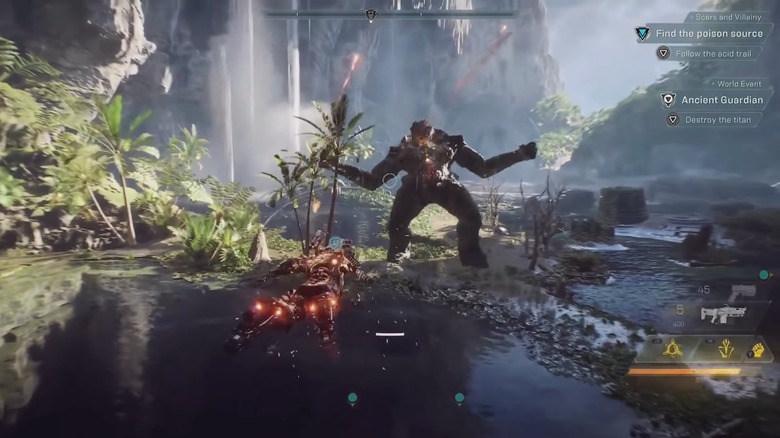The Untold Truth Of Anthem
Anthem was one of the biggest releases of 2019. Pushed for years as BioWare's riff on the loot shooter genre, expectations were high. An early trailer for the game, replete with gorgeous new mechsuits called Javelins and a tantalizing look at what appeared to be fully horizontal and vertical gameplay, only served to intensify the clamor for the game's release. Despite a roughly three-month delay, nothing could stop the momentum of EA and BioWare's new project.
Despite the fondness many had for the game before they'd even picked it up, fans of Anthem probably aren't aware of just how deep the game's development and eventual release goes. There's a lot of information buried beneath Anthem's metallic, glossy surface. Unsurprisingly, the game that was so complex it couldn't even have a straightforward release schedule has a lot of hidden secrets, and we've compiled a guide to outline the untold truth of Anthem.
Anthem was in development before Destiny 1 released
Anthem seems, at least in theory, like a direct answer to Bungie's Destiny. At the time of its release, Destiny was a bold new direction for an FPS title. Destiny blended in elements of the RPG genre like classes, skills, and progressive loot tot keep players chasing an endgame. It's no secret that the game has been wildly successful, even in spite of consistent fan complaints. It makes sense that Anthem would be designed with Destiny as its inspiration.
That inspiration is likely over-exaggerated, however. According to Anthem's lead producer Michael Gamble, the game was in development before Destiny was ever released. EA and BioWare were preparing for the future of both companies with a new IP, and it just so happens that it looked pretty similar to Bungie's title as well.
Of course, that's only part of the story. Anthem was obviously still early in development when Destiny released in 2014. That's a nearly five year window of time for Anthem to be adapted, changed, and honed to become the game the developer thought it could be. In those five years, BioWare certainly paid attention to the strengths and weaknesses of Destiny and attempted to capitalize on them. But Anthem existed well before Destiny, and it is very much its own game as a result.
Anthem is a drastic departure from BioWare's roots
BioWare is a long-term veteran of the games industry, and the studio has developed a robust fanbase as a result. The developer has also made a reputation for itself by producing some of the finest Western RPG titles ever crafted, with series like Dragon Age and Mass Effect leading the charge. Long-term fans will also remember Baldur's Gate and Neverwinter Nights. The sheer quality of the RPG experience that BioWare has refined is something few other studios can lay claim to.
With all that said, Anthem is shockingly quite different from what we've come to expect from BioWare. While it features RPG elements like classes and loot, it is also a third-person shooter at its core. The closest thing BioWare has ever made to Anthem prior to this is Mass Effect: Andromeda, but that game still leaned heavier into classic RPG tropes like character development, romance, and more intense, involved questing. Anthem is much more broad and general due to its constantly online nature, which makes it feel distinct in BioWare's games library.
Of course, BioWare isn't a stranger to multiplayer, but the game's choice of less nuanced characters is also uncharacteristic of the studio. Anthem is definitely a BioWare production, but it is also a major change in the company's approach.
Anthem's Conviction short film doesn't really mean anything ... yet
When the announcement was made that Anthem would be getting a short film ahead of its release, it was hard not to get excited. Neill Blomkamp, the director behind visually stunning movies like District 9 and Chappie, was tagged to direct the short. Blomkamp hadn't directed a film since 2015 and had been pursuing other projects in the interim, so snagging a talent that was renowned for creating flashy, compelling aesthetics was a major win for EA and BioWare.
Then the short film, "Conviction," was officially released on YouTube. It was less a film and more of a trailer, despite being made to function as a prequel to the story, since it didn't feature any major characters. Although it looked very interesting, it also didn't really say much. Fans assumed there would be more explanation once Anthem actually released and could build on the backstory that was laid down by Blomkamp's film.
Those fans would be wrong, however. "Conviction" doesn't actually function as anything more than a cool ode to Anthem's world right now. Blomkamp has stated he believes films and games will intersect in response to the feedback on the prequel, which could be his way of hinting that we will get the story behind "Conviction" at a later date. But as it is right now, we simply don't know. At the very least, if BioWare wants to set an expansion or mission within a prequel setting, they've laid a foundation for that now.
BioWare has no plans for PvP in Anthem
The natural assumption for a game like Anthem is that its online multiplayer will also feature some PvP play. Class-based combat always produces the kind of asymmetry that can make online combat interesting. Does one Javelin dominate another? What about the mirror match, which can be skill-intensive due to no natural edges for either player? These kinds of questions are a selling point for a lot of players.
But Anthem doesn't have PvP at launch, and BioWare doesn't have plans for it, either. The developer has so far indicated it would be willing to listen to fans post-launch to see what they want the most, but BioWare seems confident that online PvP won't be at the top of the list. That could be because the studio feels the focus on Anthem's more contained story and squad-based gameplay is enough on its own.
That being said, though, it could also be that BioWare isn't entirely confident in how players fighting other players will hold up under the way Anthem is currently designed. If players ask for it, we'll likely see for ourselves in the future, but until then, BioWare's decision to exclude PvP really sets Anthem apart from similar titles like Destiny or The Division 2.
Anthem lost a lot of senior staff mid-development
Anthem was in development for a long time: at least five years, according to BioWare. That naturally leads to a fair amount of turnover as developers leave the studio for other projects that are either more lucrative or simply a new, exciting opportunity. It's not uncommon, and the fact that Anthem's development team at launch is very different than when the game began its life cycle shouldn't be a big surprise.
What is strange in Anthem's case, though, is that the people who left were some of the most experienced members of the team. BioWare veterans like Aaryn Flynn, who had previously been the game's director, was promoted to studio general manager mid-way through development before finally leaving the company later. Anthem's lead animator, Steve Gilmour, left after 17 years working at BioWare. James Ohlen, a developer with 22 years of experience at BioWare, also left after spending time working on Anthem. In just the last two staff members alone, Anthem lost a combined 39 years of experience in the gaming industry. In addition, Knights of the Old Republic and Mass Effect lead writer, Drew Karpyshyn, who had also worked on Anthem, left during its production.
Given that the departures occurred at different stages in development, it seems unlikely that they occurred because of Anthem specifically. It does mean that Anthem had some adversity to overcome, though, and whether you're a fan of it or not might be related to what occurred with some of the most experienced members of the team during development.
Anthem took a lot of BioWare's resources to make
Anthem was in development for so long that it seems reasonable to think it was worked on by a tight, smaller team that was devoted to the project entirely. BioWare isn't the biggest studio on the planet (with 800 employees at last count, though it's had some ups and downs since then), despite the fact it consistently produces some of the biggest games in the RPG genre, so balancing multiple projects can be pretty resource-intensive for the developer.
As it turns out, Anthem was even more resource-hungry than BioWare had expected early on. Anthem required BioWare to pull staff from other development teams to work on it, a move that, at the time, supposedly made the game a more reasonable project to develop. Anthem had a reputation among BioWare staff of being a difficult beast to tame early on, but things seemed to turn around once the development team swelled.
BioWare had to do whatever it took to get Anthem launched. The game had a ton of resources put behind its advertising and development, so canceling was likely out of the question. For a studio that is relatively small like BioWare, though, needing to pull people off of other projects for Anthem is a testament to how time-intensive and difficult it was to create the game.
Anthem's microtransactions are a direct response to Star Wars: Battlefront 2's troubles
Anthem has a bit of a refreshing take on the microtransaction and loot box craze that has swept online services over the past few years of gaming. Anthem's microtransactions are supplemented by an in-game free currency that is fairly easy to earn. It requires grinding, sure, but it's not approaching the gaudy numbers that other games have had reported for cost to purchase in-game items.
EA had its own issue with microtransactions after players completely tore the publisher apart for its approach to Star Wars: Battlefront 2. The shooter allowed players to essentially pay real money for statistical advantages over those who either didn't want to or couldn't afford the luxury. That obviously didn't sit well with fans, creating a massive controversy that threatened to harpoon EA's reputation and drive people away from future titles.
Luckily, it appears EA has learned from its mistakes and implemented those lessons into Anthem. EA went on record as saying that the company couldn't afford another loot box or microtransaction controversy when Anthem launched. The game's relatively easy-to-navigate and more forgiving microtransactions are a direct result of that philosophy. Weirdly, Anthem players have the Battlefront community to thank for a more reasonable approach to paid in-game services in Anthem.
Anthem's flight mechanics were really hard for BioWare to get right
One of the most immediately noticeable elements of Anthem are its gorgeous flight systems. First of all, the world of Anthem is built to look amazing as players fly past the many sights in their high-powered Javelin. Beyond that, though, the actual action of flying itself is an absolute joy. The first time a Freelancer kills their jetpack to initiate a freefall, just pulling up at the last second to continue their flight, it's hard not to think that it might be the best feature of Anthem all together.
Flight being incredible in Anthem didn't come easy, though. The development team at BioWare ran into a lot of problems designing what was one of the major selling points for Anthem when the game was first announced. Game Director Jonathan Warner stated that BioWare was mostly concerned that flight would "break the game," since players can often abuse the added mobility in the environmental design to exploit coding that slipped through QA. Lead producer Ben Irving even suggested that the team had flirted with the idea of disabling flight during combat.
Thankfully, that didn't have to happen, and Anthem is a better game for it. Flight seems to be one of the most consistently well-reviewed elements of a game that has proven to be divisive and controversial, showing that BioWare was absolutely in the right to spend so much time hammering out the perfect flight system.
Anthem's gear score is a new riff on loot shooters
Gear score is a staple of the loot shooter genre. Games like Destiny employ it to help people ascertain what level they are once they've reached the endgame. Gear score also helps determine how people group up with other players: the higher the gear score, the more likely a player will be able to contribute to the more difficult missions. It's a basic element that many players count on to smooth their online play experience.
While other games gate players based on gear score, though, Anthem does not, even though it has that same feature. It's actually strange: at launch, Anthem's gear score was borderline useless, outside of showing a cumulative total of how strong the player is at a given time. The game recommends players achieve a certain gear score before playing certain difficulties, but progression doesn't revolve around loot the same way other games in the genre design it.
Gear score doesn't affect team matchmaking or enemy difficulty either, at least during freeplay and Stronghold instances. That's both a blessing and a curse. Anthem trades the addictive quality of the loot in games occupying a similar space for a more accessible gameplay style, and it remains to be seen whether this will benefit or hinder BioWare's title.
EA and BioWare are all-in on Anthem
EA and BioWare had a rough go of things before Anthem. For EA, the aforementioned Star Wars: Battlefront 2 saga soured a lot of people on the publisher's standing within the industry. For BioWare, an uncharacteristic misfire in Mass Effect: Andromeda had fans questioning whether or not the studio had lost its touch with RPGs. Both companies could use a major win, and soon.
For that reason, there's a lot at stake with Anthem's reception. BioWare desperately needs the game to do well to re-establish the unshakable faith fans previously had in the studio, while EA just needs to put out something — anything — that doesn't cause a massive controversy at release. Anthem is also the product of a relentless marketing campaign and years spent in a development period known to the public, so the hype of the game has inflated the need for it to perform well. The pressure is a known quantity, too, with both EA and BioWare throwing resources at Anthem to try and ensure its success.
The future of BioWare and EA are at stake with Anthem. A hit will help lay the foundation for a long and successful online service, compounded even further by the fact it would stand alongside Apex Legends as two Origin games that are a major draw to the platform. Anything that isn't a AAA smash hit, however, could do irreparable damage to both companies and their public images.
Anthem has a last hit system like a MOBA
Usually, games that require team-based play will have systems that are more forgiving to individual party members. For instance, killing an enemy that is tracked for a specific quest will often register that kill for all members of the team rather than the one who dealt the killing blow. It helps speed things up in questing, and doesn't actively punish players for wanting to experience the game with friends.
Anthem has a weird spin on that system that seems almost at odds with its desire to be a squad-based shooter. Blueprints for gear can be unlocked by hitting a certain number of kills on types of enemies, like Elites or Legendaries. When a player is in a group, though, Anthem requires them to get the last hit on an enemy before they die for it to count towards their own progression.
Say what you will about needing to last hit in a game that wants players to work together for progression, it's a unique system that definitely challenges the way people approach the looter shooter genre. This isn't true of the game's challenges that require taking down larger enemies like Titans, thankfully, but it's still a bizarre choice that sets it apart from other loot shooters in a big way.
Larger, tougher enemies can be frozen or set on fire: you just need to work hard at it
Some of the game's toughest challenges are its gigantic enemies. The Titans are terrifying, fire-wielding entities born from Anthem's chaotic world, and they are a challenge for players across all levels. Stronghold bosses like the Swarm Tyrant, a pulsating oozing spider-like creature, are likewise intimidating for their size and near invulnerability to game mechanics that can make smaller enemies much easier.
With that said, though, there's a mistake many Anthem players make regarding these enemies: they think they are immune to status effects. But large enemies can still be set on fire or frozen (provided they don't have resistance to those abilities), it just takes a lot more effort. The Swarm Tyrant, for instance, can be incinerated just like its smaller compatriots. If players are consistent with their use of flamethrowers and other fire-based abilities, the Swarm Tyrant can be given the fire debuff, which is extremely useful in a tough fight.
One of the criticisms of Anthem at launch was that it did a poor job of informing players about the mechanics they could use to make it more enjoyable and strategic. For that reason, the knowledge that larger enemies can be affected by status debuffs is generally not one that's known, and it requires co-ordination from multiple team members to pull off. That cohesion can be difficult if everyone isn't aware of what needs to be done.

